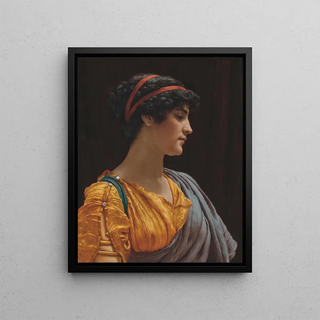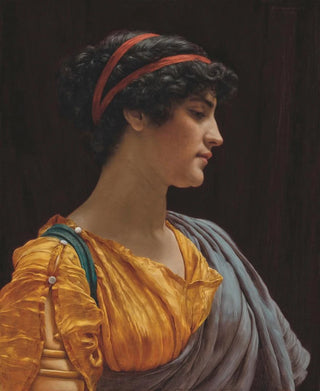Art print | Cynthia - John William Godward


View from behind

Frame (optional)
In the enchanting world of early 20th-century English painting, the art print "Cynthia" by John William Godward stands out for its beauty and refinement. This canvas, which captures the very essence of femininity and grace, transports the viewer into a realm filled with serenity and elegance. Godward, a prominent figure of the neo-classical movement, manages to evoke deep emotions through the depiction of his models, embodying an ideal of timeless beauty. The art print Cynthia - John William Godward allows for a new perspective on this work, offering an immersion into the delicate aesthetics of the artist.
Style and uniqueness of the work
Godward's style is characterized by meticulous attention to detail and a palette of delicate colors that evoke natural light. In "Cynthia," shades of blue and green blend harmoniously, creating a soothing atmosphere. The central figure, draped in light fabrics, seems to almost float in her environment, reinforcing the idea of an ethereal beauty and divine grace. Elements of nature, such as flowers and foliage, envelop the character, highlighting her connection to the surrounding world. The composition, carefully balanced, draws the eye toward the serene face of the protagonist, whose gentle and contemplative expression invites daydreaming. Each brushstroke reveals Godward's virtuosity, capturing a moment of visual poetry.
The artist and his influence
John William Godward, born in 1861, was one of the last representatives of a neo-classical style in decline in the face of early 20th-century avant-garde movements. Influenced by Renaissance masters and ancient artists, Godward reinterpreted these influences through a personal and innovative lens. His work reflects a constant pursuit of ideal beauty, both in subject choice and technical execution. Although often overshadowed by his contemporaries, Godward left an indelible mark on the art world, inspiring many artists to explore classical beauty with a modern sensibility. His ability

Matte finish

View from behind

Frame (optional)
In the enchanting world of early 20th-century English painting, the art print "Cynthia" by John William Godward stands out for its beauty and refinement. This canvas, which captures the very essence of femininity and grace, transports the viewer into a realm filled with serenity and elegance. Godward, a prominent figure of the neo-classical movement, manages to evoke deep emotions through the depiction of his models, embodying an ideal of timeless beauty. The art print Cynthia - John William Godward allows for a new perspective on this work, offering an immersion into the delicate aesthetics of the artist.
Style and uniqueness of the work
Godward's style is characterized by meticulous attention to detail and a palette of delicate colors that evoke natural light. In "Cynthia," shades of blue and green blend harmoniously, creating a soothing atmosphere. The central figure, draped in light fabrics, seems to almost float in her environment, reinforcing the idea of an ethereal beauty and divine grace. Elements of nature, such as flowers and foliage, envelop the character, highlighting her connection to the surrounding world. The composition, carefully balanced, draws the eye toward the serene face of the protagonist, whose gentle and contemplative expression invites daydreaming. Each brushstroke reveals Godward's virtuosity, capturing a moment of visual poetry.
The artist and his influence
John William Godward, born in 1861, was one of the last representatives of a neo-classical style in decline in the face of early 20th-century avant-garde movements. Influenced by Renaissance masters and ancient artists, Godward reinterpreted these influences through a personal and innovative lens. His work reflects a constant pursuit of ideal beauty, both in subject choice and technical execution. Although often overshadowed by his contemporaries, Godward left an indelible mark on the art world, inspiring many artists to explore classical beauty with a modern sensibility. His ability






